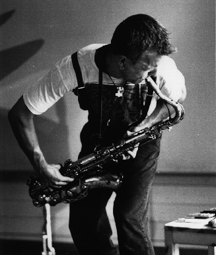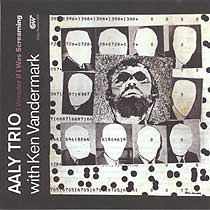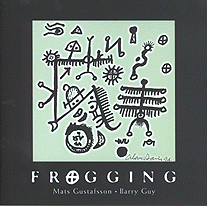
A FIRESIDE
CHAT WITH MATS GUSTAFSSON
Next
to Ken Vandermark, I can't think of anyone (well, of course Brotzmann,
but he's been doing that for years) who is taking apart the free form
like Mats Gustafsson. Gustafsson's schedule is crazy and deservingly so.
But for my babies, I got a hold of him and the following is a conversation
not with "the next big thing," but the genuine article, unedited
and in his own words.
FRED JUNG: Let's start from the beginning.
MATS GUSTAFSSON: Richard Wayne Penniman (aka Little Richard) hit me in
the stomach when I was seven years old, all that screaming and all those
saxophones and swinging drums, but most of all the energy in the voice,
the dedication. Oh, my soul!
FJ: Was the saxophone your first instrument?
MATS GUSTAFSSON: I'm a classical flute player from the beginning but needed
to play the sax after listening to Sonny Rollins at the Umeå International
Jazz Festival in my hometown when I was 15. And the horn will keep me
busy for the rest of my life. That's for sure! There is no limits to it.
That is kind of interesting to me.
FJ: Growing up in Sweden, what were you listening to?
MATS GUSTAFSSON: It was a small, hidden scene, geographically "offside"
in Northern Scandinavia. But a lot of visiting groups at the local jazzclub
in Umeå made it! Lokomotiv Konkret, Per Henrik Wallin Trio, Conny
Bauer, Steve Lacy Septet with George Lewis (life changing), all melted
the snow for us! There was also a great, small record shop, Burmans Musik,
that actually were bringing in great shit like FMP and all that. Listening
to Machine Gun in headphones at that shop after school was huge! Knees
shaking like jelly. Stomach reaction like after being served a Booker's
bourbon by Bruno Johnson for the first time, a pretty great experience
that was.
FJ: Do you enjoy bourbon?
MATS GUSTAFSSON: Yes, of course.
FJ: You should try Maker's Mark or Knob Creek.
MATS GUSTAFSSON: They are OK, but not great (not full enough). But Booker's
is killer or Woodford Reserve or Old Rip Van Winkle.
FJ: You mentioned how you would listen to Brötzmann's Machine Gun.
What was your initial impression of the music?
MATS GUSTAFSSON: Of course the energy, the insane level of energy and
that raw, beautiful sound. Yes, yes, yes.
FJ: Discuss the impact of Sounds: Contemporary Swedish Improvised Music
on Scandinavian improvised music.
MATS GUSTAFSSON: It was really important to document the scene in 1989
when I was part of the new generation of players (with Kjell Nordeson,
Christian Munthe, Johannes Bergmark) meeting the ones who laid the ground
for it all (Sten Sandell, Raymond Strid, Dror Feiler, Jörgen Adolfsson,
Sune Spångberg, Tuomo Haapala). That two LP set that Blue Tower
Records released still stand up really well I think and managed to spread
some light over a "hidden" scene. In 1999, there was a need
to do it again (this time Blue Tower released a 3-CD set with a book!)
since we now had a totally new generation of players and they are many
and really, really good too. Unbelievable what the standard are now and
the originality, players like David Stackenäs, Johan Berthling, Fredrik
Ljungkvist, Lindha Svantesson rock my planet! They are all great! This
generation plus the fact that there has been a similar explosion in Norway
too and a lot of projects going back and forth with great Norwegians like;
Paal Nilsen Love, Ingebrigt Haaker Flaten, Haakon Kornstad, Ingar Zach,
Ivar Grydeland - really makes everything looking really interesting at
the moment up here.
FJ: When did you form the AALY Trio? And how did the addition of Ken Vandermark
change the dynamic of the group?
MATS GUSTAFSSON: AALY Trio was formed by me and drummer Kjell Nordeson
(both from Umeå) in about 1986, even if we started to play together
already in 1980. The existing trio with Peter Janson has been going on
since 1995 and Ken joined the group in late 1996. It is of course of great
importance to have a working group where you share the experience and
history and are able to explore music and stuff under a long time. That's
a great privilege! Having Ken joining was just obvious. It was necessary!
AALY Trio with Ken is just that; a huge fucking privilege to work with.
The dedication and energy that are shared within the group is just fantastic.
No way we gonna slow down.
FJ: Give me your impressions of these players: Fredrik Ljungkvist, Kjell
Nordeson, Johan Berthling, and Raymond Strid.
MATS GUSTAFSSON:
a) Fredrik Ljungkvist - fantastic player, enormous output and very advanced,
a beautiful melodic player, totally dedicated!
b) Kjell Nordeson - my man, what can I say? He has it all! Probably the
most underrated drummer I know of. The only minus is that he is not at
all interested in vinyl.
c) Johan Berthling - metabass-player, great talent, great sound, very
serious and totally open to new things. He is so damn good, when he goes
into more aggressive playing, he is evil.
d) Raymond Strid - Raymond, the best Raymond there is! Yes, yes, yes.
He rules the planet! Very, very important in my universe. He has taught
me so much, a lot. Raymond is the king of Sweden!
FJ: How influential have the following icons been to your musical development:
Albert Ayler, John Coltrane, Ornette Coleman, Eric Dolphy, and Peter Brötzmann?
MATS GUSTAFSSON:
a) Albert Ayler - wouldn't be possible without!
b) John Coltrane - wouldn't be possible without!
c) Ornette Coleman - wouldn't be possible without!
d) Eric Dolphy - wouldn't be possible without!
e) Peter Brötzmann - wouldn't be possible without!
They all rule in their own way.
FJ: How much composing are you doing now?
MATS GUSTAFSSON: Everything that feels challenging to me musically I need
to try. Composing is, for sure, challenging, simply because you don't
need to compose to be able to create great music. You just have to be
in a situation with people you trust and believe in and improvise. Therefore,
I need to try and see if there is ways to combine that freedom with pre-de-structuring,
or pre-de-composing, or other ways to organize. Yes, I'm actually right
now in the process of finishing a new piece (Hidros 4 / SAPMI-Tribute)
for the NU-ensemble that will be premiered in Paris on April 3. Me and
Paul Lovens is writing for the group this year.
FJ: Don't you think your life would have been easier if you played bebop
instead?
MATS GUSTAFSSON: Absolutely not! This is what I'm doing and there has
never been any second thoughts on that, no other alternatives. And why
should you play bebop now anyway? What is the reason to recreate somebody
else's music now and do it "perfectly" dead like Wynton and
colleagues? I thought people wanted to be personal in their music, to
create their own thing, but that seems not always to be true.
FJ: What prompted you launch your own label, Crazy Wisdom?
MATS GUSTAFSSON: I started the label last year with producer Christian
Falk and Conny Charles Lindstrom. There was just a need to document the
great shit happening in Sweden and outside Sweden. So we just started
it. Next release are DA Trio (Mats Gustafsson, Thurston Moore, and Jim
O`Rourke)
FJ: Is jazz dead?
MATS GUSTAFSSON: What is jazz?
FJ: Why are European improvisers being looked at now for the advancement
of this music more so than their American counterparts?
MATS GUSTAFSSON: It's not about Europeans or Americans really. Creative
music has to do with the individual players or groups involved as far
as I'm concerned.
FJ: Chicago is the hub of improvised music these days. It is considerably
outpacing New York, which is far more recognized by the media. What are
they putting in the water in Chicago? Who are the musicians that are creating
such excitement? And why do musicians like yourself, Brötzmann, Han
Bennink, and a list too long to name going to Chicago to play?
MATS
GUSTAFSSON: Well, the steaks are great (there is no foot and mouth disease
or crazy cow disease) and the microbreweries are really steaming and there
is great record shopping too! Yes, the players are great and there is
a really great vibe there among the people involved in the scene. Credits
should go to John Corbett, Bruno Johnson, Fred Anderson, Ken Vandermark,
Jim O´Rourke, Michael Zerang, Empty Bottle, and a bunch of other
really great people. It's been really fantastic to take part of it since
1994, to see it grow, and to see all the projects that has been flying
back and forth from Chicago and Stockholm. Fantastic! And when Brötzmann
formed his Chicago Tentet, things got heavy! On the other hand, it's dangerous
to say that there is nothing of interest happening in, for instance, NYC.
There is so much great fucking music there right now, unbelievable. Check
Tonic out! Heaven! In a city where William Parker, Thurston Moore, Joe
McPhee, David Grubbs, John Zorn all lives, things can't go that wrong,
right?
FJ:
John Corbett has been important in shedding light on Chicago's underground.
MATS
GUSTAFSSON: Everyone is contributing to the scene in their own way. Every
contribution is of importance. Of course, John has been a major force
to establish it all and make it all possible. He is great to work with
and there is a lot planned for the future. And of course, he is my best
record freak buddy.
FJ:
Corbett mentioned you are a bit of a record fanatic. How much did you
spend last year on records?
MATS
GUSTAFSSON: Enough, but collecting records really means swapping and trading
with friends like Corbett or Thurston in a never ever ending story.
FJ:
How much vinyl do you have in your collection?
MATS
GUSTAFSSON: Enough.
FJ:
Where do you go in Chicago to buy records?
MATS
GUSTAFSSON: Dusty Grooves primarily and at some secret little corners
around the Windy City.
FJ:
Give me some of your favs.
MATS
GUSTAFSSON: They always differ, of course, from day to day, from hour
to hour, from minute to minute. But life would be difficult without Spiritual
Unity, that's for sure!
Fred
Jung is the Editor-In-Chief and thinks gas prices being this high is a
conspiracy by the Exxon Corporation. Email
Him.



